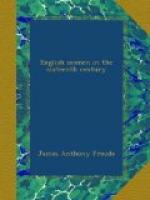At dark that Friday night the beacons were seen blazing all up the coast and inland on the tops of the hills. They crept on slowly through Saturday, with reduced canvas, feeling their way—not a sail to be seen. At midnight a pinnace brought in a fishing-boat, from which they learnt that on the sight of the signal fires the English had come out that morning from Plymouth. Presently, when the moon rose, they saw sails passing between them and the land. With daybreak the whole scene became visible, and the curtain lifted on the first act of the drama. The Armada was between Rame Head and the Eddystone, or a little to the west of it. Plymouth Sound was right open to their left. The breeze, which had dropped in the night, was freshening from the south-west, and right ahead of them, outside the Mew Stone, were eleven ships manoeuvring to recover the wind. Towards the land were some forty others, of various sizes, and this formed, as far as they could see, the whole English force. In numbers the Spaniards were nearly three to one. In the size of the ships there was no comparison. With these advantages the Duke decided to engage, and a signal was made to hold the wind and keep the enemy apart. The eleven ships ahead were Howard’s squadron; those inside were Drake and the adventurers. With some surprise the Spanish officers saw Howard reach easily to windward out of range and join Drake. The whole English fleet then passed out close-hauled in line behind them and swept along their rear, using guns more powerful than theirs and pouring in broadsides from safe distance with deadly effect. Recalde, with Alonzo de Leyva and Oquendo, who came to his help, tried desperately to close; but they could make nothing of it. They were out-sailed and out-cannoned. The English fired five shots to one of theirs, and the effect was the more destructive because, as with Rodney’s action at Dominica, the galleons were crowded with troops, and shot and splinters told terribly among them.
The experience was new and not agreeable. Recalde’s division was badly cut up, and a Spaniard present observes that certain officers showed cowardice—a hit at the Duke, who had kept out of fire. The action lasted till four in the afternoon. The wind was then freshening fast and the sea rising. Both fleets had by this time passed the Sound, and the Duke, seeing that nothing could be done, signalled to bear away up Channel, the English following two miles astern. Recalde’s own ship had been an especial sufferer. She was observed to be leaking badly, to drop behind, and to be in danger of capture. Pedro de Valdez wore round to help him in the Capitana, of the Andalusian squadron, fouled the Santa Catalina in turning, broke his bowsprit and foretopmast, and became unmanageable. The Andalusian Capitana was one of the finest ships in the Spanish fleet, and Don Pedro one of the ablest and most popular commanders. She had 500 men on board, a large sum of money, and,




